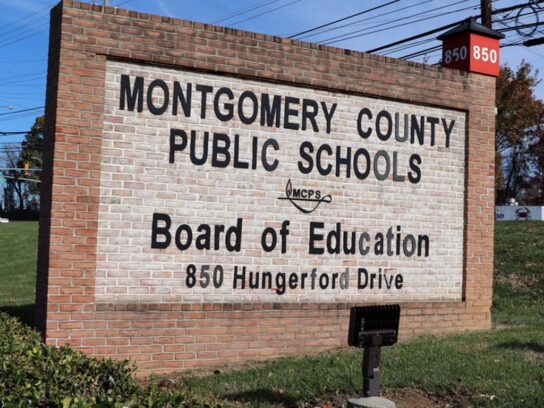
Montgomery County Board of Education candidates discussed school resource officers and opt-out programs during a Thursday candidate forum hosted by The League of Women Voters of Montgomery County.
At Large, District 2 and District 4 candidates will appear on the May 14 primary election ballot. Early voting runs from May 2 to May 9.
Opt-out
Opt-out policies, which allow parents to block their students from reading or learning about certain topics, became a heated topic in March 2023. This was when insert the board of education clarified that parents could only opt out of health and human sexuality units, not other units, which could include LGBTQ+ inclusive books.
Religious groups and parents’ rights activists sued and protested the school board, pushing for an opt-out policy for books. A federal judge sided with the school board and no such opt-out policy was implemented.
At-large candidates Rita Montoya, Melissa Kim and Lynne Harris all opposed an opt-out policy and said the curriculum should reflect the diversity of Montgomery County.
“It’s windows and mirrors,” Harris said. “We want to make sure every students sees themselves reflected in the content they’re taught … but we also want them to learn more about others whose experiences are different.”
Fitzgerald Mofor, an at-large candidate, supported of opt-out policies and moving the “inclusive curriculum” from language arts to the opt-outable health and family life units.
“It’s tyrannical to demand that parents fund an education system and not allow them to have an input in their education system,” Mofor said.
At-large candidate Sharif Hidayat is also a supporter of opt-out policies and said the board of education had taken an “abrasive approach to people of faith.”
District 2 candidates Rebecca Smondrowski and Natalie Zimmerman oppose opt-out policies, while Candidates Aby Thioye, Brenda Diaz and Ricky Mui support them.
District 4 candidates Laura Stewart and Shebra Evans are against opt-out. Bethany Mandel is pro-opt-out and is a part of the group suing the school system over this issue.
Police Officers in Schools
The school district brought back school resource officers, now called community engagement officers, less than a year after removing the officers over concerns about racial bias by the officers. Community engagement officers are not permanently stationed on campus or patrolling the halls like resource officers did, but are provided with a workspace on school grounds and are available if-needed.
The candidates overwhelmingly supported the presence of officers in some capacity on school grounds to build relationships with students and improve safety, but many had ideas about how to improve the program.
While officers could be another person in the school building to build relationships with students, Kim said officers need trauma-based and hate-bias training so every adult is “working hard towards our children’s support and growth.”
Officers in schools should be hand-picked role models for students, Smondrowski said, and officers should be stationed in elementary and middle schools.
Improved communication between the officers, school leadership and students is important to candidates Stewart, Harris and Evans.
Multiple candidates, including Zimmerman, asked for more data on the success of the community engagement officer program. Zimmerman pushed for more mental health support for students because, she said, to be preventive and not just reactive about school safety concerns.
“Students need to feel emotionally safe before anything else and that will help take care of these other issues,” Zimmerman said.
Mandel, Morfor, Diaz, Mui and Thioye support bringing back school resource officers, permanently on-campus and patrolling school grounds. Removing student resource officers is the top mistake made by the school district, Mandel said.
“Whenever there is a school lockdown at one of my kid’s schools, I feel good and safe when I know that the police officers are in the school to respond,” Thioye said.


Comments are closed.